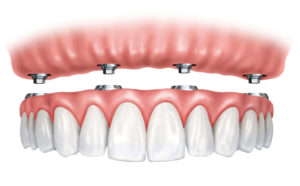DENTAL IMPLANTS INCLUDING ALL-ON-4
Dental implants are a unique way to address tooth loss. Unlike conventional prosthetics such as bridges or dentures, dental implants address the loss of the roots of teeth. These small, titanium posts are placed into the jawbone and will serve as pillars or anchors for prosthetics like dental crowns, bridges and even dentures.

DENTAL IMPLANTS INCLUDING ALL-ON-4
Dental implants are a unique way to address tooth loss. Unlike conventional prosthetics such as bridges or dentures, dental implants address the loss of the roots of teeth. These small, titanium posts are placed into the jawbone and will serve as pillars or anchors for prosthetics like dental crowns, bridges and even dentures.
The Basics on Dental Implants
Dental implants are used to hold prosthetics. Functioning like a tooth’s root, a single implant can hold a tooth-shaped crown or a series of crowns (bridge). If a patient has suffered total tooth loss, multiple implants can be placed to secure a denture.
The reason dental implants are able to function like the biological roots of teeth is because of their construction. Made from titanium, dental implants are biocompatible. This means that bone will generate new tissue that will fuse to and around the implant to hold it in place. Titanium, unlike other metals and prosthetics, will not be rejected as a foreign object by the body. Dental implants can effectively hold prosthetics that replace visible tooth structure while lasting for decades, if not the rest of a person’s life.
Dental implants are low maintenance, as well. Patients care for and maintain their implants and the prosthetics attached to them as they would normally care for biological teeth by brushing, flossing and attending routine oral health checkups.
Implant-Supported Fixed Prosthesis (All-On-4)
For patients who have lost a considerable amount of teeth, implant supported dentures are often a great option for restoring one’s ability to eat and speak comfortably as well as improve one’s appearance. All-on-4 is a method of placing four dental implants throughout the jaw in very precise locations so that they can support a full denture. By anchoring dentures to implants, patients will not experience denture movement during oral function, be able to eat a variety of foods without difficulty, and enjoy a lifelike appearance.

To learn more about your tooth replacement options, we invite you to schedule a consultation with our oral surgeon, Dr. Jackson. At your appointment, we can help you determine the best type of treatment for your needs.
Dental Implants FAQs
Most frequent questions and answers
A: A dental implant is a titanium prosthetic that is used to replace the root system of a tooth. It somewhat resembles the appearance of a screw because it has a ridged construction. It is embedded into the jawbone, where bone mass will eventually stabilize the titanium prosthetic by fusing to it. Bone fuses to dental implants through a biological process called osseointegration. This process is possible with titanium because this metal is biocompatible; meaning that the body will recognize titanium like it would natural mineralized structure. Osseointegration is what makes a titanium implant ideal for replacing lost hard tissue.
Once the implant has become stabilized, it can then support prosthetics that replace the visible structures of teeth. Common prosthetics that are attached to a dental implant include dental crowns and bridges. A series of dental implants can be used to anchor a full arch of prosthetic teeth like dentures.
A: The cost of dental implants varies depending on a patient’s particular situation. Sometimes, patients require preliminary treatments prior to receiving an implant. For instance, before the implantation process, a patient may need to have teeth surgically extracted or bone grafts to improve the density of bone. Another factor that affects cost is the number of dental implants being placed.
Insurance coverage can vary between plans and carriers. Because coverage is so varied, it is important for patients to consider their dental and medical insurance coverage when it comes to receiving implants. If you have questions about payment and insurance coverage, we recommend that you speak with our financial coordinator. Our staff is trained to file claims on your behalf, help you understand your coverage, and develop estimates on the costs of treatment(s) based on your unique situation and the treatment plan developed by our oral surgeon after your consultation.
A: While dental implants are an ideal tooth replacement method, certain health and lifestyle factors can affect one’s candidacy. Successful implantation depends on factors like a patient’s density of bone in the jaw as well their overall oral health. Issues with gum and bone health or a history of periodontal disease can affect one’s candidacy for implants. Moreover, it is important that patients are healthy enough to undergo oral surgery.
The only way to be sure if you are a candidate for dental implants is to schedule a consultation with our oral surgeon. At your appointment, we can determine if preliminary treatments for gum disease or other procedures such as bone grafting can improve the likelihood of success with dental implants after we perform a thorough oral health evaluation.
A: Dental implants are placed through a surgical procedure. Our oral surgeon will embed the implant through the empty tooth socket into the jawbone. The top of the implant features an abutment that will be later used to hold permanent prosthetics like dental crown or bridges.
A: Implanted support dentures are a method of anchoring full arches of prosthetic teeth to a series of dental implants. In many cases, as few as four dental implants can hold a full arch of dentures in either the upper or the lower jaw. The placement of dental implants depends on a patient’s unique anatomy. Each implant is embedded into a strategic location so that the implants can evenly distribute pressure and force associated with oral function.
